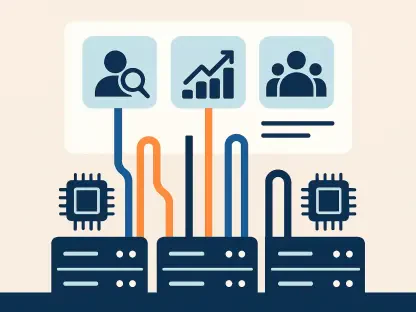In a groundbreaking move that’s set to redefine the customer experience (CX) landscape, Salesforce and ServiceNow have jointly invested $1.5 billion in Genesys, a trailblazer in AI-powered experience orchestration. This significant financial commitment, evenly divided between the two tech powerhouses, goes beyond mere capital injection—it’s a strategic alliance aimed at revolutionizing how businesses connect with their customers through advanced AI technologies. By repurchasing shares from existing equity holders and fostering deeper collaboration, this partnership is poised to drive innovation in customer interaction tools. For companies of all sizes, particularly small and midsize enterprises (SMBs), this development could unlock access to sophisticated solutions that were once the domain of larger corporations. The implications are vast, promising a future where personalized, autonomous customer engagement becomes the norm rather than the exception, reshaping competitive dynamics across industries.
Unleashing the Potential of AI in Customer Experience
The foundation of this monumental investment lies in the surging demand for AI-driven customer experience solutions, as evidenced by Genesys Cloud’s remarkable financial performance, boasting nearly $2.1 billion in annual recurring revenue with a growth rate exceeding 35% year-over-year. Such figures, alongside a net revenue retention rate consistently above 120% for several quarters, reflect not only strong customer loyalty but also a clear market trend favoring intelligent platforms. The spotlight here is on “agentic AI,” a concept where systems operate independently to anticipate and resolve customer needs without ongoing human input. With the support of Salesforce and ServiceNow, Genesys is set to integrate these autonomous features into its offerings, enabling businesses to deliver highly personalized interactions on a large scale, potentially transforming the efficiency and effectiveness of customer service operations across diverse sectors.
This push toward AI innovation signals a shift in how customer engagement is conceptualized, moving from reactive to proactive strategies. The technology behind agentic AI allows for predictive analytics and real-time decision-making, which can significantly reduce response times and improve satisfaction rates. For businesses, this means not just meeting but exceeding customer expectations by addressing issues before they escalate. Genesys, backed by this substantial investment, is positioned to lead this charge, offering tools that could redefine service standards. While the benefits are clear, the challenge lies in ensuring that these advanced systems are intuitive enough for widespread adoption, especially among organizations lacking extensive tech infrastructure. This focus on autonomy in AI represents a critical step forward in making customer experience a competitive differentiator.
Collaborative Innovations Shaping Seamless Interactions
A cornerstone of this strategic partnership is the collaborative development of integrated solutions, such as the CX Cloud, a joint effort between Genesys and Salesforce that merges customer experience functionalities with CRM systems for cohesive customer and employee journeys. This integration allows for a unified view of interactions, eliminating silos that often hinder effective service delivery. Similarly, the Unified Experience offering, developed with ServiceNow, consolidates multiple communication channels into a single AI-powered interface, streamlining complex workflows. For SMBs, which frequently manage diverse touchpoints with limited resources, these tools offer a way to reduce operational friction, ensuring consistency and saving valuable time while handling customer inquiries across platforms.
Beyond simplifying operations, these collaborative solutions aim to enhance the quality of customer interactions by leveraging AI to provide context-aware responses. Businesses can benefit from reduced manual effort as these platforms automate routine tasks, allowing staff to focus on more complex issues that require a human touch. The synergy between Genesys, Salesforce, and ServiceNow creates a powerful ecosystem where data flows seamlessly between systems, offering actionable insights that drive better decision-making. However, the adoption of such integrated tools often demands a learning curve and initial setup costs, which could pose barriers for smaller firms. Despite these challenges, the potential for these innovations to create smoother, more efficient customer experiences underscores the transformative nature of this partnership.
Breaking Barriers to Advanced Technology Access
One of the most compelling aspects of this $1.5 billion deal is its potential to democratize access to enterprise-grade AI technologies. Historically, platforms like Genesys Cloud have primarily served large corporations with the budget to afford such sophisticated systems, but this investment suggests a future where smaller businesses might also harness similar capabilities. Industry voices from Salesforce and ServiceNow highlight the importance of AI-assisted workflows and personalized customer journeys in driving loyalty, increasing revenue, and cutting operational costs. This vision of making high-end tools more accessible aligns with the growing need for scalable, cost-effective solutions that enable SMBs to compete in crowded markets without breaking the bank.
Yet, the road to widespread adoption is not without obstacles, as SMBs often grapple with the financial burden of upfront investments and the technical expertise required to integrate these advanced systems. The question remains whether scaled-down or more user-friendly versions of these AI tools will emerge to cater to smaller players. Without such adaptations, the gap between large enterprises and SMBs could persist, limiting the true impact of this technological shift. Nevertheless, the intent behind this investment—to bring cutting-edge solutions to a broader audience—marks a significant step toward leveling the playing field. As this trend unfolds, it will be critical to monitor how accessibility evolves, ensuring that the benefits of AI in CX are not confined to a select few but shared across the business spectrum.
Positioning for Dominance in a Dynamic Market
From the perspective of Salesforce and ServiceNow, this investment solidifies their leadership in the rapidly evolving AI-driven CX market. Salesforce is focused on enhancing AI-supported customer experiences across both voice and digital channels, aiming to create more intuitive and responsive interactions. Meanwhile, ServiceNow targets predictive, personalized workflows that deliver quantifiable business outcomes, emphasizing efficiency and impact. Their collaboration with Genesys, under the guidance of CEO Tony Bates, places them at the cutting edge of an ecosystem where autonomous systems are increasingly vital to operational success, offering a competitive edge in a crowded field.
This strategic alignment is not merely about technological advancement but about creating tangible value through partnerships that redefine business operations. By combining their strengths, these companies are crafting a robust framework that could set new industry standards for customer engagement. The emphasis on measurable results—such as improved loyalty and reduced costs—resonates with business leaders seeking clear returns on tech investments. As autonomous AI becomes more embedded in CX strategies, this alliance positions Salesforce, ServiceNow, and Genesys to influence how companies of all sizes approach customer relationships. The broader market will likely feel the ripple effects of this deal, as competitors adapt to keep pace with these forward-thinking innovations.
Reflecting on a Game-Changing Partnership
Looking back, the $1.5 billion investment by Salesforce and ServiceNow in Genesys stood as a defining moment in the journey of AI-driven customer experience solutions. It underscored an industry pivot toward autonomous, tailored systems that reshaped business-customer interactions in profound ways. While the financial scope of the deal might not have directly touched smaller enterprises, the resulting advancements in platforms like Genesys Cloud, along with collaborative tools such as CX Cloud and Unified Experience, offered immense potential for enhancing CX capabilities across the board. Challenges like integration costs and complexity were hurdles that needed addressing to ensure broader uptake. Moving forward, it became essential for business leaders, especially in smaller firms, to assess their preparedness for adopting these intelligent tools, seizing the chance to stay competitive in an ever-evolving market. This partnership highlighted the power of strategic collaboration, setting a precedent for future innovations that prioritized measurable impact and accessibility.









